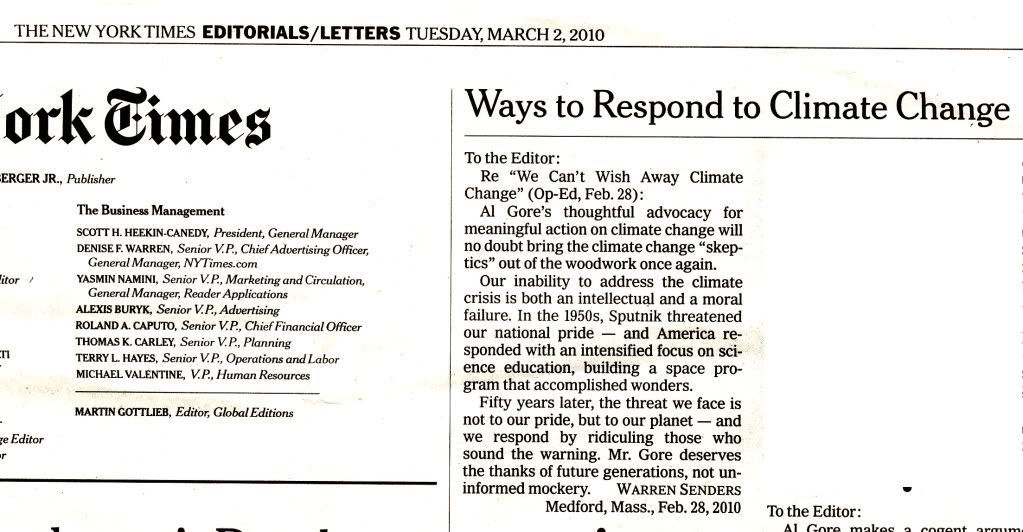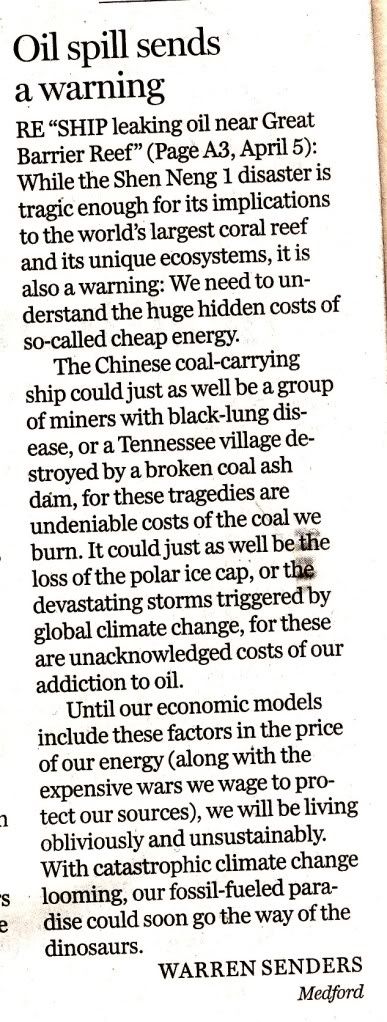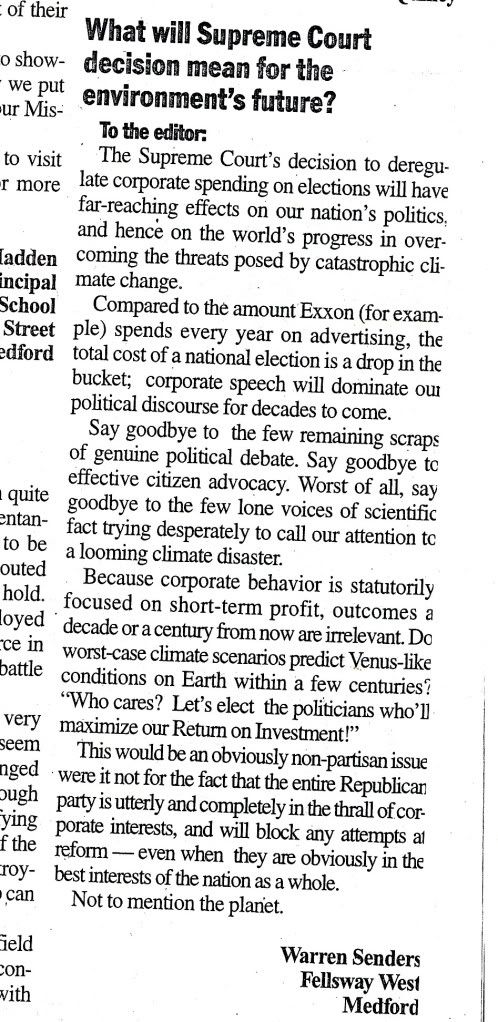environment Politics: Harry Reid immigration reform Nancy Pelosi
by Warren
1 comment
Meta
SiteMeter
Brighter Planet
Month 4, Day 22: I Never Understood Football, But I Think I Know What “Punting” Means
Democratic leaders are pushing ahead with plans to move comprehensive immigration reform legislation this year — even if it means punting on energy legislation until next Congress.
(snip)
During the meeting, Reid “reiterated his intention to move forward” this year on immigration reform, one aide said, adding that Pelosi agreed it is a top priority, even beyond energy legislation.
“The Speaker did agree that if faced with a choice between energy and immigration, she’d go with immigration,” the aide said.
However, a House Democratic aide insisted that Pelosi’s comments were aimed only at the timing of the two issues, and that she meant that immigration could advance before energy reform.
So….a letter to Nancy and Harry:
Dear Speaker Pelosi and Majority Leader Reid,
I was distressed to read in today’s “Rollcall” that the priority treatment accorded to immigration reform is apparently making it more likely that a comprehensive and robust energy and climate bill will have to wait until after the 2010 elections.
There is not much time left for us to get things done if we are to have a hope of making a difference. Many climatic tipping points have already been passed. Arctic methane is beginning to enter the atmosphere; the oceans are approaching dangerous levels of acidity. Atmospheric CO2 is well above safe levels and climbing. The worst-case Venusian scenarios outlined by Dr. James Hansen have moved out of the realm of wild speculation and are now statistically significant probabilities. And meanwhile, our representatives in government are anxious — about their own political safety.
Let me be clear: there will never be a time when it is “politically safe” to make robust and meaningful climate/energy legislation come to pass. Why? Because the time lag between climate action and climate effect is longer than the elected term of a U.S. Senator, let alone a Representative. Thus, there is no mechanism in our electoral system that encourages longer-term thinking. But this is an explanation, not an excuse.
America and the planet need this bill to be passed; we need it to be comprehensive and robust, and we need it to have regulatory teeth. The lives of our descendants hang in the balance. There is no time to lose; no time to waste. We’ve put off genuine climate action for decades. Don’t put it off again.
Yours Sincerely,
Warren Senders
environment Politics: ECPA Hillary Clinton Steven Chu
by Warren
leave a comment
Meta
SiteMeter
Brighter Planet
Month 4, Day 21: Good Work!
I read about a gathering of representatives from all over Latin America that took place in Washington, the Energy and Climate Partnership of the Americas Ministerial, hosted by Dr. Steven Chu. Hillary Clinton’s statement to the group are worth reading in their entirety…and it’s worth watching Secretary Chu’s opening remarks:
So I wrote him a letter of support.
Dear Secretary Chu,
It was with great pleasure that I read about the Energy and Climate Partnership of the Americas (ECPA) Ministerial which you hosted recently in Washington. It is crucial to the long-term health of the planet that the USA embrace new energy technologies, making sure that they are made available to nations across the world. The ECPA is a vital element in this process.
The actions of governments and communities throughout South America demonstrate what can happen when sustainability is taken seriously by people at all levels, from ordinary citizens to the highest reaches of government. The use of indigenous energy sources is not only a stimulus for local economies, but an essential element in the fight against global climate change.
But there are massive economic forces allied against energy localization — forces whose profits are threatened by any move away from fossil fuels. As our government moves closer to passing climate and energy legislation, the oil and coal interests will disseminate ever more misinformation, making a robust bill less and less likely. Please use the power of your position to convey to the President and to members of Congress that the United States needs to lead the world on this issue; if we cannot lead, we must at least support energy sustainability initiatives in Latin America and the rest of the world. Right now, the Carbon Lobby is doing all it can to make sure that no one gets free from the deadly addiction to fossil energy — and our lawmakers are enabling them.
This can’t go on. The eyes of the world are upon us; what we do in the next few years will determine whether future generations inherit a sustainable and beautiful planet, or an economic and environmental catastrophe.
The Energy and Climate Partnership of the Americas is a great start. We need to do more; there is so much more to do.
Yours Sincerely,
Warren Senders
Fifi? Fifi? Oh, my god, Fifi!
My mother gets the Amherst Bulletin every week, and when we go to visit her, I always turn eagerly to the police report section. Not because there are interesting crimes, but because I might get to read stuff like this:

India Indian music music: genius khyal Ramakrishnabua Vaze
by Warren
2 comments
Meta
SiteMeter
Brighter Planet
Ramakrishnabua Vaze: Raga Mian Ki Malhar
As promised long ago, here is the full-length version of Vazebua’s Mian ki Malhar. The two khyals are both classics; the vilambit is Karim naam tero; the drut Bolare papihara.
The accompanists are both superb. Sarangi is provided by Ustad Bundu Khan, playing his special small humaniform sarangi; tabla is by a young Ustad Alla Rakha. Vazebua was in his eighties, so there are moments when his intonation loses focus or his breath control gives out before his idea has been resolved, but these are minor quibbles…the performance as a whole is riveting, the last recorded testament of one of the form’s greatest masters.
All India Radio Recording: Raga Mian Ki Malhar
Pandit Ramakrishna Vaze
Rajeev Vaze, Bua’s great-grandson, commented on one of the earlier posts:
I would like to elaborate on couple of things in line with my comment that ‘Bua was much ahead of his times’. He was one of the first musicians and possibly the only one, who published books on many compositions with notation, which he acquired from his Gurus by way of extreme hard work. The idea behind this was to throw open his stores to every follower of music. There are many books written by estiblished musicians thereafter but all those are without notations and the students can not gain anything except the literature.
You will also realise that not many stalwarts were mentally prepared to cut records under the pretext that their music will become common and thereby loose its value. Realising the importance of documentation and it’s usefulness for generations to come, Buwasaheb not only mastered the art of modulating his voice so as to suit the recording machines available in those days but tried to present different facets such as Thumari, Tarana, Bhajan along with the khyal on the number of records being cut.Unfortunately, all his deciples died at a very young age and most of them such as Master Deenanath, Keshaorao Bhosale, Bapusaheb Pendharkar belonged to Theatre. His work is not known to present generation. I’ve seen many people sing / like compositions from dramas such as ‘Sanyasta Khadga’, ‘Shah Shivaji’ etc with a wrong presumption that these are composed by Master Deenananth. This is incorrect as all these and many more are composed by Buwasaheb. There are many songs composed by Pt Hridaynath which are based on the original compositions of Vazebua and the listeners are still enjoying.
environment Politics: financial reform Harry Reid
by Warren
leave a comment
Meta
SiteMeter
Brighter Planet
Month 4, Day 20: Their Cash, Our Trash
A version of yesterday’s letter, this one to Harry Reid.
Dear Majority Leader Reid,
As financial reform legislation comes to the floor of the Senate, it’s important to recognize that the gutting of America’s economy is deeply and powerfully linked with the destruction of America’s environment. Irresponsible short-term thinking, motivated entirely by considerations of immediate profit, is at the root of both our financial crisis and our climate emergency.
Only a vigorous regulatory regime can keep giant corporate interests from exploiting legislative loopholes to the detriment of our financial and environmental health. Economically and environmentally destructive behavior is rooted in a systemic bias toward short-term economic thinking. As long as it is based on a model of unregulated consumption, our economy will remain unsustainable. Big banks buying and selling incomprehensible credit derivatives; cheap plastic junk that winds up in oceanic garbage patches — this is the face of unrestrained and short-sighted consumption, and it’s profoundly damaging to our country and to the world.
We need our corporations to focus on long-term thinking, something which is currently discouraged by the terms of corporate charters. We only have a little time left to determine whether we will leave our descendants a meaningful future or an exploitative dystopia. To fix the climate, we must transform our economy, making it essential that the largest economic forces in the country give back more to the Earth than they take out.
We can’t afford to lose this one.
Yours Sincerely,
Warren Senders
environment Politics: Chris Dodd economy financial reform John Kerry
by Warren
leave a comment
Meta
SiteMeter
Brighter Planet
Month 4, Day 19: Turning Your Money Into Trash
Financial reform is very important, not only because Goldman Sachs and the rest of the shark pack have ripped the guts out of our economy, but because these mega-bankers care as much about the environment as they do about the people below them on the economic ladder. That is to say, not at all. Unsustainable environmental practices go hand in hand with unsustainable business practices, and it’s time to make sure that shit is absolutely never going to happen again.
Dear Senators Kerry and Dodd,
This letter is about the connection between climate legislation and financial reform.
Any reasonably robust climate bill will be fought tooth and nail by business interests in this country, which is a sure indication that environmental legislation needs to be coupled with financial reform. Ultimately, our destruction of the environment is rooted in a systemic problem in our economic thinking. Our economy is largely built on an unsustainable practice: buying things and turning them into trash as quickly as possible. This happens on Wall Street when the big banks buy and sell incomprehensible credit derivatives to one another, and it happens on Main Street when our stores sell us cheap plastic-wrapped junk that breaks and winds up in a landfill a week later.
An economic model based on turning things into trash will ultimately destroy our nation, and us along with it. We tell our children to contribute to society, to leave things better than we found them — but unless we can end our reliance on consumption as a way of life, our fine words are nothing more than hypocritical prating. The next few decades will determine whether we live in a world that offers our children and their children a meaningful future or a landscape clogged beyond recognition with toxic trash. We can’t fix the climate unless we transform our economy — until we focus our power and attention on living in ways that give back more to the Earth than we take out.
During the debate on the financial reform bill, it is my hope that you will point out to your colleagues in the Senate (and to the nation) that what unsustainable financial practices have done to our economic health, unsustainable consumption habits are doing to our environment. Our nation, and the world, can afford this no longer.
Yours Sincerely,
Warren Senders
environment: allergens hay fever
by Warren
leave a comment
Meta
SiteMeter
Brighter Planet
Month 4, Day 18: More “Allergy” Stuff
U.S. News and World Report had a little squib about the same report referenced two days ago — all about how there were going to be a lot more allergens in the air, so allergy sufferers were going to be even more miserable than they usually are.
I shortened and revised my earlier letter, and used their dedicated submissions form to send it in.
It’s not just the eyes and noses of allergy sufferers that will be hit by global warming. Allergies and asthma are already huge loss factors almost everywhere in our economy: 12 billion dollars and 14 million school and work days to hay fever alone; $15 billion in medical costs and $5 billion in lost earnings a year to asthma. If, as scientists predict, climate change doubles or triples the level of ragweed allergens in our air, the economic effects are going to be disastrous.
On the other hand, antihistamine manufacturers will be excellent investment opportunities; we’ll be able to sneeze all the way to the bank.
All joking aside, this is just one tiny aspect of the most serious threat humanity has ever faced. We must take strong action to reduce greenhouse gas emissions, or it’s going to hurt a lot more than our noses.
Warren Senders
music: country music genius George Jones
by Warren
leave a comment
Meta
SiteMeter
Brighter Planet
George Jones: One Of A Kind (R.I.P.)
George Glenn Jones (born September 12, 1931 – died April 26, 2013) is an American country music singer known for his long list of hit records, his distinctive voice and phrasing, and his marriage to Tammy Wynette.
Over the past 20 years, Jones has frequently been referred to as “the greatest living country singer.”[1] Country music scholar Bill C. Malone writes, “For the two or three minutes consumed by a song, Jones immerses himself so completely in its lyrics, and in the mood it conveys, that the listener can scarcely avoid becoming similarly involved.”
Throughout his long career, Jones made headlines often as much for tales of his drinking, stormy relationships with women, and violent rages as for his prolific career of making records and touring. His wild lifestyle led to Jones missing many performances, earning him the nickname “No Show Jones.” With the help of his fourth wife, Nancy, he has been sober for many years. Jones chalked up more than 150 hits during his career, both as a solo artist and in duets with other artists.
“The Grand Tour” — I admire the way he references the lower register, anchoring his tenor lines with occasional grace notes from an octave below. Fabulous pitch, of course — and the emotional veracity of the performance is undeniably powerful.




